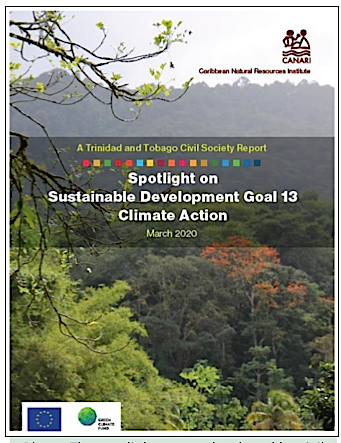Civil society delivers 30 priorities for accelerating climate action in Trinidad and Tobago

Port of Spain, June 22, 2020 – Civil society in Trinidad and Tobago is urging accelerated action on climate change for sustainable development and COVID-19 recovery. Thirty civil society priorities for climate action were delivered as part of the newly launched Trinidad and Tobago Civil Society Report: Spotlight on Sustainable Development Goal (SDG) 13 Climate Action. The report, which highlights inadequate progress and the critical need for ramping up efforts to address climate change, was released on Monday, June 15, 2020, at a virtual launch event hosted by the Caribbean Natural Resources Institute (CANARI).
Developed with inputs from 53 civil society organisations (CSOs) working across the SDGs and in diverse sectors, the landmark civil society report comes as the Trinidad and Tobago Government is preparing to present its Voluntary National Review (VNR) on progress in implementing the SDGs at the United Nations High-level Political Forum on Sustainable Development in July 2020.
Speaking at the launch, CANARI Technical Officer and coordinator for the spotlight report, Ms. Candice Ramkissoon, noted the VNR was viewed as “an
opportunity to develop a civil society report to ensure civil society perspectives are captured and our voices included.” She also emphasised that “while the Government is reporting on a number of other SDGs in
addition to SDG 13, climate change is a cross cutting sustainable development issue which warrants increased attention and urgent integrated action across sectors to address.” This is especially important given the vulnerability associated with Trinidad and Tobago’s
status as a small island developing state.
CANARI and the SDGs Catalysts Network (a network of 21 leading CSOs) convened under the recently
concluded CSOs for Good Governance project (2017-2020), mobilised CSOs to develop the report, with
financial support of the European Union and the Green Climate Fund. Participating CSOs engaged in
cross cutting analysis of climate change in 5 key thematic areas:
The result was a scorecard of
level of progress in achieving them, as assessed by civil society.
Some of the key overarching recommendations emerging from the CSOs’ analysis include the need for: improving coordinated climate action and mechanisms for engaging civil society; updating the Climate Change Policy (2011); reformation of the Green Fund to improve access to climate financing; placing increased focus on local adaptive capacity, especially of the poor and most vulnerable groups; and updating the national development monitoring framework to take into account and effectively track progress on SDG 13 across sectors.
Other invited speakers at the launch lauded the efforts by CANARI and participating CSOs in developing the report.
In his address, Dr. Mark Thomas, Associate Development Coordination Officer representing the United Nations Resident Coordinator’s Office , commended the active role being played by civil society in tracking national development progress. Mr. Kishan Kumarsingh, Head of the Multilateral Environmental Agreements (MEA) Unit in the Ministry of Planning and Development and internationally recognised climate expert, also welcomed the report and noted that the 30 priorities identified were
‘spot on’ and in alignment with provisions of the Paris Agreement on climate change. Mr. Kumarsingh further emphasised the critical role of CSOs as champions for climate action in various sectors and agreed with the need for an ‘all hands-on deck approach’ and a ‘synchronised chorus of voices’, saying it was essential to treat with the climate emergency. In highlighting existing efforts and plans by the MEA Unit for climate action, he acknowledged the need for strengthening CSO participation in developing a working agenda for climate change in Trinidad and Tobago.
Participants at the launch agreed on the need for an increased environment focus and turning words into action moving forward. CANARI’s Executive Director, Nicole Leotaud highlighted the report as taking on an even greater importance in the midst of the COVID-19 pandemic, to contribute to a push to put climate responses at the heart of recovery – so that there is a clean, green and just recovery and approach to building resilience in Trinidad and Tobago. In noting linkages and common lessons offered by the current pandemic and worsening climate crisis, she noted that we must not be so eager “to jump out of the COVID-19 frying pan into the climate change fire.”
Overall, CANARI noted the process for developing the report could be a potential model for more meaningful civil society engagement in development in Caribbean countries. Ultimately, CANARI hopes the report will encourage increased consideration for how civil society can be a strong partner to government for a ‘whole of society’ approach to climate action. CANARI urged the Government to consider the report as part of the submission for the official Trinidad and Tobago VNR which is soon to be published.
About CANARI: The Caribbean Natural Resources Institute (CANARI) is a regional technical non -profit organisation which has been working to promote and facilitate stakeholder participation in the stewardship of natural resources in the Caribbean for over 30 years. See http://www.canari.org/.





